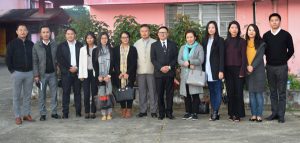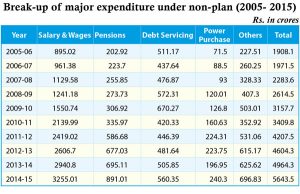FRIDAY, MAY 09, 2025
- Home
- State managing only due to award by 14th Fin. Commission—official
State managing only due to award by 14th Fin. Commission—official
Published on Nov 2, 2017
By EMN
Share
[caption id="attachment_147651" align="alignnone" width="550"] Secretary, Kikheto Sema, deputy director (training), Hovithal Sothu and NCS probationers after the interactive session at Kohima on November 1.[/caption]
Our Correspondent
Kohima, Nov. 01 (EMN): Had it not been for the generosity of the 14th Finance Commission described as the ‘most favourable awards’ it would not have been possible to run the state of Nagaland with the burden of a huge deficit of Rs. 1542.7 cr. from the closing of the 13th Finance Commission.
This was observed by Y. Kikheto Sema, secretary land resources department who was also earlier a secretary in the finance department at an interactive session with NCS probationers at ATI on November 1.
Presenting an overview of the state finances and its sustainability, Sema pointed out that the state continue the dependency on central grants with huge expenditure on major components of non-plan on salary and wages, pension payment, debt servicing, power purchase, grant-in-aid etc.
Secretary, Kikheto Sema, deputy director (training), Hovithal Sothu and NCS probationers after the interactive session at Kohima on November 1.[/caption]
Our Correspondent
Kohima, Nov. 01 (EMN): Had it not been for the generosity of the 14th Finance Commission described as the ‘most favourable awards’ it would not have been possible to run the state of Nagaland with the burden of a huge deficit of Rs. 1542.7 cr. from the closing of the 13th Finance Commission.
This was observed by Y. Kikheto Sema, secretary land resources department who was also earlier a secretary in the finance department at an interactive session with NCS probationers at ATI on November 1.
Presenting an overview of the state finances and its sustainability, Sema pointed out that the state continue the dependency on central grants with huge expenditure on major components of non-plan on salary and wages, pension payment, debt servicing, power purchase, grant-in-aid etc.
 Nagaland with a total population of 19.81 lac. has the highest number of government employees in comparison with other Northeast states with a total of 12,53,09 (both regular and fixed) employees with a 1:15 ratio of government employees to population in a total of 82 departments, second highest in India.
Sema stated that as per the 13th Finance Commission norms, the state government employees status in 2014-15 should have been 79432, whereas the state had an excess of 45877 employees.
Among the 12 departments, school education department topped the list with 27278 employees and spending 22.51 cr. on salaries followed by civil police with 26853 employees and spending 22.71 cr. on salaries.
Citing some challenges such as excess departments, schools, district administration and offices, excessive employees, huge recurring expenditure, too many roads with maintenance problems, loss of revenue on power etc, Sema impressed on the need for constant monitoring and control to manage the state’s finances by adopting certain austerity measures.
He also emphasised on the need for cordial relationship between civil societies and government, politicians and bureaucracy, regard and respect between inter-service associations etc.
Encouraging the probationers, Sema has suggested them to take it as a challenge if posted at remote area and be a missionary for socio-economic transformation, focus on quality education and value of life, check on village development funds, encourage active women participation etc.
The probationers were also urged to emphasis on dignity of labour wherever they are posted in future, encourage on local products and maintain a good coordination with other departments
.
Nagaland with a total population of 19.81 lac. has the highest number of government employees in comparison with other Northeast states with a total of 12,53,09 (both regular and fixed) employees with a 1:15 ratio of government employees to population in a total of 82 departments, second highest in India.
Sema stated that as per the 13th Finance Commission norms, the state government employees status in 2014-15 should have been 79432, whereas the state had an excess of 45877 employees.
Among the 12 departments, school education department topped the list with 27278 employees and spending 22.51 cr. on salaries followed by civil police with 26853 employees and spending 22.71 cr. on salaries.
Citing some challenges such as excess departments, schools, district administration and offices, excessive employees, huge recurring expenditure, too many roads with maintenance problems, loss of revenue on power etc, Sema impressed on the need for constant monitoring and control to manage the state’s finances by adopting certain austerity measures.
He also emphasised on the need for cordial relationship between civil societies and government, politicians and bureaucracy, regard and respect between inter-service associations etc.
Encouraging the probationers, Sema has suggested them to take it as a challenge if posted at remote area and be a missionary for socio-economic transformation, focus on quality education and value of life, check on village development funds, encourage active women participation etc.
The probationers were also urged to emphasis on dignity of labour wherever they are posted in future, encourage on local products and maintain a good coordination with other departments
.
 Secretary, Kikheto Sema, deputy director (training), Hovithal Sothu and NCS probationers after the interactive session at Kohima on November 1.[/caption]
Our Correspondent
Kohima, Nov. 01 (EMN): Had it not been for the generosity of the 14th Finance Commission described as the ‘most favourable awards’ it would not have been possible to run the state of Nagaland with the burden of a huge deficit of Rs. 1542.7 cr. from the closing of the 13th Finance Commission.
This was observed by Y. Kikheto Sema, secretary land resources department who was also earlier a secretary in the finance department at an interactive session with NCS probationers at ATI on November 1.
Presenting an overview of the state finances and its sustainability, Sema pointed out that the state continue the dependency on central grants with huge expenditure on major components of non-plan on salary and wages, pension payment, debt servicing, power purchase, grant-in-aid etc.
Secretary, Kikheto Sema, deputy director (training), Hovithal Sothu and NCS probationers after the interactive session at Kohima on November 1.[/caption]
Our Correspondent
Kohima, Nov. 01 (EMN): Had it not been for the generosity of the 14th Finance Commission described as the ‘most favourable awards’ it would not have been possible to run the state of Nagaland with the burden of a huge deficit of Rs. 1542.7 cr. from the closing of the 13th Finance Commission.
This was observed by Y. Kikheto Sema, secretary land resources department who was also earlier a secretary in the finance department at an interactive session with NCS probationers at ATI on November 1.
Presenting an overview of the state finances and its sustainability, Sema pointed out that the state continue the dependency on central grants with huge expenditure on major components of non-plan on salary and wages, pension payment, debt servicing, power purchase, grant-in-aid etc.
Break-up of major expenditure under non-plan (2005- 2015)
 Nagaland with a total population of 19.81 lac. has the highest number of government employees in comparison with other Northeast states with a total of 12,53,09 (both regular and fixed) employees with a 1:15 ratio of government employees to population in a total of 82 departments, second highest in India.
Sema stated that as per the 13th Finance Commission norms, the state government employees status in 2014-15 should have been 79432, whereas the state had an excess of 45877 employees.
Among the 12 departments, school education department topped the list with 27278 employees and spending 22.51 cr. on salaries followed by civil police with 26853 employees and spending 22.71 cr. on salaries.
Citing some challenges such as excess departments, schools, district administration and offices, excessive employees, huge recurring expenditure, too many roads with maintenance problems, loss of revenue on power etc, Sema impressed on the need for constant monitoring and control to manage the state’s finances by adopting certain austerity measures.
He also emphasised on the need for cordial relationship between civil societies and government, politicians and bureaucracy, regard and respect between inter-service associations etc.
Encouraging the probationers, Sema has suggested them to take it as a challenge if posted at remote area and be a missionary for socio-economic transformation, focus on quality education and value of life, check on village development funds, encourage active women participation etc.
The probationers were also urged to emphasis on dignity of labour wherever they are posted in future, encourage on local products and maintain a good coordination with other departments
.
Nagaland with a total population of 19.81 lac. has the highest number of government employees in comparison with other Northeast states with a total of 12,53,09 (both regular and fixed) employees with a 1:15 ratio of government employees to population in a total of 82 departments, second highest in India.
Sema stated that as per the 13th Finance Commission norms, the state government employees status in 2014-15 should have been 79432, whereas the state had an excess of 45877 employees.
Among the 12 departments, school education department topped the list with 27278 employees and spending 22.51 cr. on salaries followed by civil police with 26853 employees and spending 22.71 cr. on salaries.
Citing some challenges such as excess departments, schools, district administration and offices, excessive employees, huge recurring expenditure, too many roads with maintenance problems, loss of revenue on power etc, Sema impressed on the need for constant monitoring and control to manage the state’s finances by adopting certain austerity measures.
He also emphasised on the need for cordial relationship between civil societies and government, politicians and bureaucracy, regard and respect between inter-service associations etc.
Encouraging the probationers, Sema has suggested them to take it as a challenge if posted at remote area and be a missionary for socio-economic transformation, focus on quality education and value of life, check on village development funds, encourage active women participation etc.
The probationers were also urged to emphasis on dignity of labour wherever they are posted in future, encourage on local products and maintain a good coordination with other departments
.
